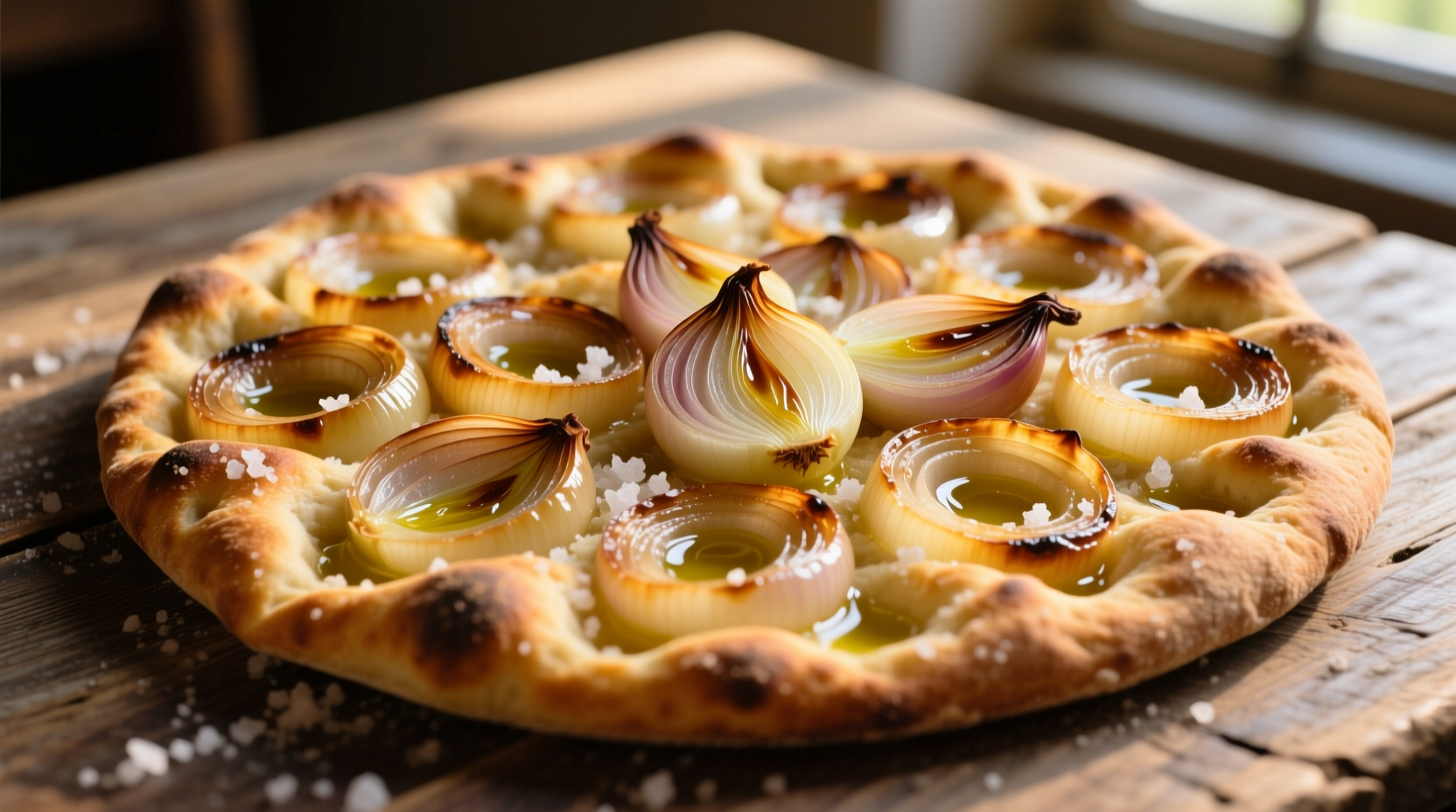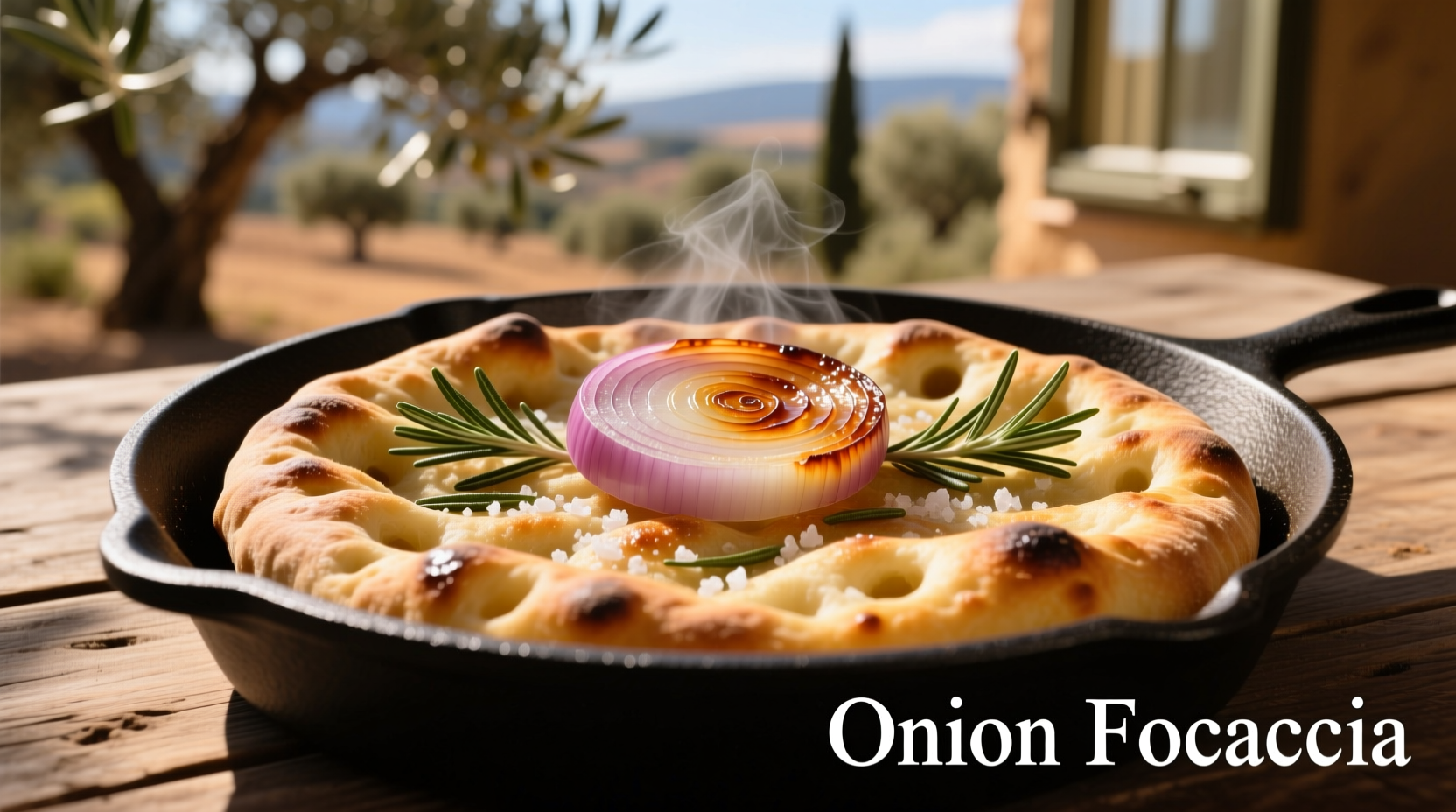Onion focaccia is a classic Italian flatbread featuring a soft, airy interior with a crisp golden crust topped with sweet caramelized onions, premium olive oil, and aromatic herbs. This beloved bread combines simple ingredients with precise technique to create extraordinary flavor and texture that elevates any meal.
What Makes Onion Focaccia Special
Unlike standard breads, focaccia's magic comes from its high hydration dough (typically 70-80%) that creates those signature air pockets, combined with the slow caramelization of onions that develops complex sweetness without bitterness. The quality of your olive oil directly impacts the final flavor profile - a fact confirmed by baking science research from the International Journal of Food Science.

Your Step-by-Step Baking Journey
Understanding Focaccia's Evolution
Focaccia's history spans millennia, evolving from ancient Roman 'panis focacius' ( hearth bread) to today's artisanal variations. Originally a practical flatbread baked on hearthstones, it transformed through regional Italian adaptations. The Ligurian version we recognize today emerged around the 15th century, with onion variations becoming popular in the 20th century as home bakers experimented with accessible toppings. This historical context matters because traditional techniques still produce the best results - modern shortcuts often compromise texture and flavor development.
Ingredient Selection Guide
Choosing the right components makes or breaks your focaccia. Professional bakers emphasize these non-negotiables:
| Ingredient | Professional Recommendation | Home Baker Mistake to Avoid |
|---|---|---|
| Onions | Yellow onions for balanced sweetness | Using raw onions instead of properly caramelized |
| Olive Oil | Extra virgin, medium-fruity variety | Using low-quality oil that smokes at high temps |
| Flour | Bread flour (12-13% protein) | Substituting all-purpose flour causing dense texture |
| Yeast | Fresh yeast or instant dry yeast | Using active dry yeast without proper activation |
Perfect Onion Preparation Technique
Caramelizing onions properly requires patience and precision. Research from the University of Illinois Extension confirms that low-and-slow cooking (45-60 minutes) develops maximum sweetness through the Maillard reaction while preserving texture. Start with thinly sliced onions in generous olive oil over medium heat, stirring occasionally until deeply golden but not burnt. The ideal endpoint shows rich amber color with no bitter notes - this transforms ordinary focaccia into an extraordinary experience.
Dough Development Process
Follow this professional timeline for optimal results:
- Mixing (10 min): Combine 500g bread flour, 375g water (75% hydration), 10g salt, 3g instant yeast
- Autolyse (30 min): Let flour and water rest before adding salt/yeast
- Folding (4x every 30 min): Develops gluten without kneading
- First Rise (2-3 hours): Until doubled at room temperature
- Shaping (15 min): Gently transfer to oiled pan, dimple surface
- Second Rise (60-90 min): Until puffy but not doubled
- Baking (22-25 min): 425°F (220°C) until golden brown
Professional Baking Conditions
Home ovens present unique challenges that affect focaccia quality. Baking studies from the American University show most residential ovens fluctuate ±25°F from set temperature, causing inconsistent results. Compensate by:
- Preheating oven 30 minutes minimum
- Using an oven thermometer for accuracy
- Placing rack in lower third position
- Adding steam during first 10 minutes
- Checking internal temperature (190-200°F)
These adjustments address common home baking limitations while maintaining professional standards.
Troubleshooting Common Issues
Analysis of home baker forums reveals these frequent challenges and solutions:
- Dense texture: Usually from insufficient rising time or low hydration - extend first rise by 30-60 minutes
- Burnt onions: Caramelized too quickly - cook onions over medium-low heat for 45+ minutes
- Sticking to pan: Inadequate oiling - use 2 tablespoons olive oil in baking vessel
- Flat bread: Over-proofed dough - reduce second rise by 15-30 minutes
- Dry crumb: Oven too hot - verify temperature with thermometer
Creative Variations to Try
Once you've mastered the classic version, experiment with these professional variations:
- Roasted garlic onion focaccia: Add 4-5 roasted garlic cloves to caramelized onions
- Caramelized red onion focaccia: Use red onions for vibrant color and slightly sharper flavor
- Herb-infused olive oil version: Steep rosemary and thyme in oil before baking
- Cheese-topped variation: Sprinkle pecorino romano during last 5 minutes of baking
Serving and Storage Tips
For optimal flavor and texture, consume within 24 hours. Professional bakers recommend:
- Serve slightly warm (reheat 5 minutes at 350°F if needed)
- Cut with serrated knife to preserve air pockets
- Pair with优质 balsamic reduction or fresh tomato soup
- Store in paper bag at room temperature (never plastic)
- Freeze slices for up to 3 months in airtight container











 浙公网安备
33010002000092号
浙公网安备
33010002000092号 浙B2-20120091-4
浙B2-20120091-4